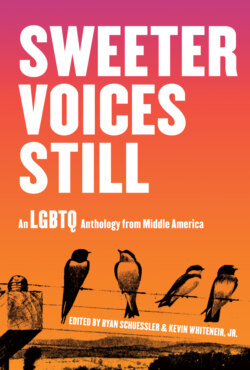Читать книгу Sweeter Voices Still - Группа авторов - Страница 17
На сайте Литреса книга снята с продажи.
ОглавлениеThe Bridge
St. Louis, MO
MARY MAXFIELD
The fourth fell on a Wednesday. “Ladies” night at the local gay bar. My wife, Melissa, and I had spent the day in her hometown, Belleville, helping her parents and avoiding “happy Independence Day” well-wishes. We were itching from new mosquito bites. We were itching in other ways, too, hungry for something more us than strip malls in oversized parking lots, chain stores decked in red, white, and blue.
We’d each grown up in southern Illinois, forty minutes from the other. I loved that we were from the same place, loved the magic of having met a girl in Virginia who’d grown up on the same strange diet of Jell-O salads, green bean casserole, and Ski. I loved it more because—like me—she’d found her way somewhere else and had no intention of a permanent return. When we did move back to the Midwest, her students teased her. “I said I’d never move back to Belleville, and I didn’t,” she told them. “We live in U City.”
In other words, we lived across the river.
Growing up where we did, the river felt like a mystical barrier. Most people I knew would drive hours across Illinois but balk at spending forty minutes crossing the bridge into St. Louis. Later, I’d recognize the ridiculousness—and the racism—inherent in this attitude, but at the time, it simply transformed the city into a strange and fascinating mystery. On occasion, my uncle—who looked like a hippie Albus Dumbledore, from his long gray beard and ponytail to his bolo tie and Birkenstocks—would take us to the Loop, a strip of shops and galleries, punctuated by drum circles and street musicians. I’d stare, awe-struck, at humans bright with dyed hair and tattoos, remembering a girl who scandalized my grade school by dying her brown hair red.
Now, we lived a mile from that same strip. I had my own tattoo from the local shop. On weekends, Melissa and I biked Forest Park, the nearby mass of lawns and algae-covered lakes. Its landscapes immediately recalled those of my childhood: prairies lit with moths, still waters bubbling with unseen life. On the south end, the highway broke the illusion of countryside. Across the river, I was somewhere else.
That Fourth of July, Melissa drove us to the Grove, a stretch of Manchester that functioned as the current gayborhood. It wasn’t a gaybor hood as I imagined one: bears and butches walking their dogs, coffee shops soundtracked by spoken word. It was, instead, a series of gay and gay-friendly bars that generally awoke after my bedtime. Still, the rainbow and trans flags lining the streets relaxed my shoulders. The “Black Lives Matter” signs in the windows pushed me further into relief. Here, Melissa and I could hold hands across the table, dance, pretend freedom felt everyday. No small thing, anywhere.
That night, though, we were feeling bitter. We’d spent two years trying to find community—volunteering at the local LGBTQ community center, weeding the Trans Memorial Garden—only to introduce ourselves, once more, to the same impenetrable clique of queers we’d already met five times. We’d set up a meetup group for other local queer folks wishing to make friends. The Facebook page had taken off, but each offline invitation crashed and burned. We’d extended another invitation tonight and could already see the tumbleweeds taking shape. Instead, I sat alone at a high table. Melissa ordered drinks. Nearby, kg lang—the women’s folk rock tribute band we’d come to hear—set up on a makeshift stage. They’d moved inside, away from the screeching cicadas, in anticipation of a storm. I sat sweating inside the screened-in porch, waiting for my gin, and staring at the Table.
The Table was impossible to ignore. It stood feet away, on the other side of the screen, near the outdoor bar. The Table was actually a collection of tables, haphazardly arranged into one organism. Around it, an improbable number of lesbians perched on stools or leaned on those who did. The night had barely started, and I sat alone, watching another lesbian, another lesbian, and yet another lesbian join this nearby group. Each one caused the assembled crowd to cheer, erupt from their seats and share a hug. I opened and closed apps on my phone, grateful when Melissa returned with my drink. Grateful for someone to know, and something to hold.
“How do we get that?” I asked, nodding my head toward the crew of butches, femmes, and queers behind us.
“We don’t,” she said. “They’re full.”
Around us, the music started. My gin and tonic tasted strong. I moved my straw in circles, trying to stir the bitterness smooth.
Then the music started, and my foot tapped, in spite of me.
